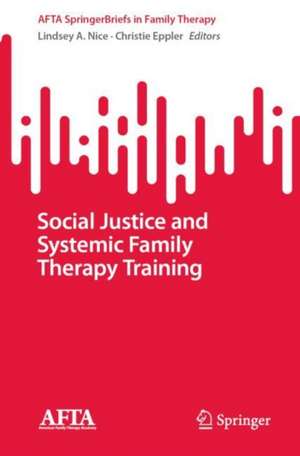Social Justice and Systemic Family Therapy Training: AFTA SpringerBriefs in Family Therapy
Editat de Lindsey A. Nice, Christie Eppleren Limba Engleză Paperback – iun 2023
The book addresses issues of power that systemic family therapy educators face within the academia itself at three different levels:
- Personal interactions with students that create more complete understanding of issues of power.
- Professional interactions with colleagues that provide support and accountability.
- Political interventions aimed at changing the larger academic institution.
Social Justice and Systemic Family Therapy Training is an essential resource for clinicians, therapists, and practitioners as well as researchers, professors, and graduate students in family studies, clinical psychology, and public health as well as all interrelated disciplines.
Preț: 359.78 lei
Preț vechi: 378.71 lei
-5% Nou
Puncte Express: 540
Preț estimativ în valută:
68.84€ • 71.88$ • 56.85£
68.84€ • 71.88$ • 56.85£
Carte tipărită la comandă
Livrare economică 15-29 aprilie
Preluare comenzi: 021 569.72.76
Specificații
ISBN-13: 9783031299292
ISBN-10: 3031299299
Pagini: 114
Ilustrații: XV, 114 p. 1 illus.
Dimensiuni: 155 x 235 mm
Greutate: 0.2 kg
Ediția:1st ed. 2023
Editura: Springer International Publishing
Colecția Springer
Seria AFTA SpringerBriefs in Family Therapy
Locul publicării:Cham, Switzerland
ISBN-10: 3031299299
Pagini: 114
Ilustrații: XV, 114 p. 1 illus.
Dimensiuni: 155 x 235 mm
Greutate: 0.2 kg
Ediția:1st ed. 2023
Editura: Springer International Publishing
Colecția Springer
Seria AFTA SpringerBriefs in Family Therapy
Locul publicării:Cham, Switzerland
Cuprins
Chapter 1. Structural Changes to Support Marginalized Family Therapy Students: Personal, Professional, and Political Issues for Educators.- Chapter 2; Relational Social Justice in Systemic Family Therapy: Looking in the Mirror with Others Bearing Witness.- Chapter 3. Building Relational Trust in Systemic Family Therapy by Addressing Racial Stains.- Chapter 4. Decolonizing Higher Education by Incorporating Antiracist Pedagogy in Systemic Family Therapy Academics, Mentorship, and Training.- Chapter 5. Unburdening the Pressure of Identity Through Co-Teaching a Diversity Course in Systemic Family Therapy.- Chapter 6. Using Self-Disclosure to Deepen Racial Dialogues in Systemic Family Therapy Classroom Settings.- Chapter 7. Addressing Value Differences Among Family Therapy Faculty: Issues of Race on Campus.- Chapter 8. Person of the Therapist: An Ethical Training Model.- Chapter 9. Inviting Diverse Voices into Systemic Family Therapy Program Leadership.
Notă biografică
Lindsey A. Nice, Ph.D., LMFT, RN, is an associate professor and clinic director for the marriage and family therapy program at Pacific Lutheran University in Tacoma, Washington. Dr. Nice is the co-editor of Socially Just Religious and Spiritual Interventions (Springer, 2018), and she is author of several book chapters and journal articles. Before going into academia, Dr. Nice worked as a nurse at a small hospital in Oregon and still enjoys learning about the intersections of physical, mental, and relational health. Her research interests include family therapy pedagogy, medical family therapy, religion and spirituality in therapy, and relational equity. Outside of work, she enjoys spending time with her husband and two toddlers on their six-acre farm.
Textul de pe ultima copertă
The book examines the lived experiences of systemic family therapy educators. It addresses the issues of power and justice that they face in family therapy training programs, including their teaching experiences with students, interactions with faculty, and challenges within academic institutions. It describes how family therapy programs attempt to incorporate cultural awareness with mixed results (e.g., focusing only on how to work with diverse clients or not supporting faculty from across social locations). The book explores the ways in which family therapy educators with intersecting marginalized identities continue to be oppressed across different areas of academia.
The book addresses issues of power that systemic family therapy educators face within the academia itself at three different levels:
The book addresses issues of power that systemic family therapy educators face within the academia itself at three different levels:
- Personal interactions with students that create more complete understanding of issues of power.
- Professional interactions with colleagues that provide support and accountability.
- Political interventions aimed at changing the larger academic institution.
Caracteristici
Examines social justice in teaching experiences of systemic family therapy educators Focuses on countering harmful practices of racism, sexism, and homophobia in family therapy education Promotes social justice accountability and growth in family therapy training
















